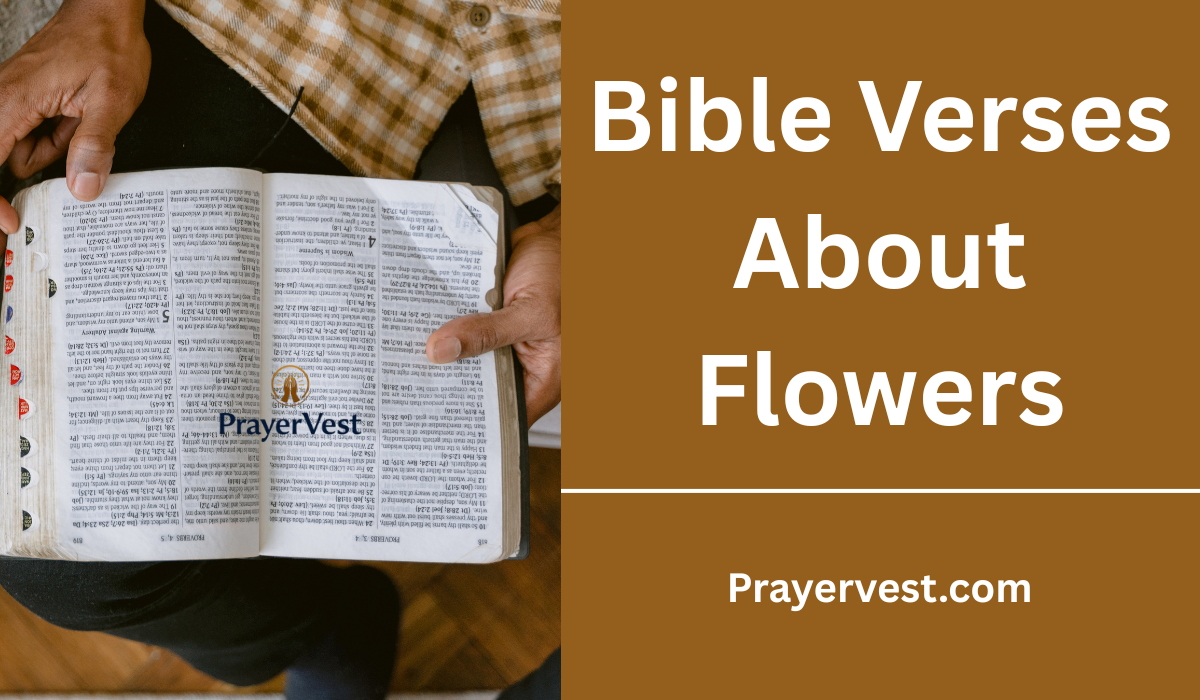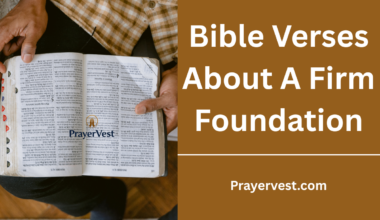Flowers retain a special place in the Bible, often employed as potent symbols of beauty, fragility, and the transient aspect of life. Their exquisite petals serve as a reminder of how delicately God cares for His creation and point us to the craftsmanship of the Creator.
Scripture uses flowers as metaphors and pictures to convey ideas like God’s providence, human existence, and the difference between eternal truth and earthly splendor. The Bible frequently connects our lives to these fleeting yet exquisite creations, much like flowers blossom and fade.
Flowers are used in numerous passages to emphasize the transient nature of human might and material wealth, serving as a reminder that everything is impermanent aside from God. However, they also provide striking examples of God’s concern and care.
How much more will the Lord take care of His children if He can so exquisitely adorn the fields with wildflowers? Even during uncertain times, these scriptures encourage us to have faith in God’s provision. Therefore, flowers come to represent both humility and hope, reminding us to put our trust in the One who supports everything rather than in ourselves.


In addition to representing fleeting things, flowers in the Bible also symbolize God’s beauty, majesty, and rebirth. They serve as reminders of God’s continuous process of restoration and the promise of new life, from the flowering almond branch in Jeremiah’s vision to the lilies of the field in Jesus’ teachings. We can view creation as a living story that teaches us about faith, trust, and the timeless beauty of God’s presence as we study Bible texts on flowers. The spiritual truths woven throughout the petals of creation are a reminder to calm down, enjoy the beauty around us, and read these verses.
40 Inspiring Bible Verses About Flowers (2026)
1. Song of Solomon 2:12
“Flowers appear on the earth; the season of singing has come, the cooing of doves is heard in our land.”
This verse paints a beautiful picture of renewal and joy. The blossoming of flowers marks the arrival of spring, a time associated with new beginnings and love. Just as flowers bloom after winter, this imagery reminds us that God brings seasons of restoration after times of trial. Flowers here symbolize hope, beauty, and the flourishing of life under God’s care.
2. Isaiah 40:8
“The grass withers and the flowers fall, but the word of our God endures forever.”
In this powerful verse, flowers are used to illustrate the temporary nature of life. Just as blossoms fade and fall, human life and earthly beauty are fleeting. Yet, in contrast, God’s Word remains eternal and unchanging. This passage calls us to anchor our lives not in what is temporary, but in the everlasting truth of Scripture that never withers away.
3. Matthew 6:28-29
“See how the flowers of the field grow. They do not labor or spin. Yet I tell you that not even Solomon in all his splendor was dressed like one of these.”
Here, Jesus draws attention to the effortless beauty of wildflowers as a lesson in trust. Flowers do not worry, toil, or strive, yet they are clothed with unmatched splendor by God Himself. This verse teaches us to rely on God’s provision, rather than being consumed by anxiety over material needs. The beauty of flowers is a testimony to the Creator’s abundant care.
4. Psalm 103:15-16
“The life of mortals is like grass, they flourish like a flower of the field; the wind blows over it and it is gone, and its place remembers it no more.”
This psalm reflects on the brevity of human existence. Like flowers that bloom and fade quickly, our lives on earth are temporary. Yet, the reminder here is not meant to discourage but to point us to God’s everlasting love and mercy that outlasts human frailty. Flowers remind us of life’s fragility, urging us to live with eternal perspective.
5. James 1:10-11
“But the rich should take pride in their humiliation—since they will pass away like a wild flower. For the sun rises with scorching heat and withers the plant; its blossom falls and its beauty is destroyed. In the same way, the rich will fade away even while they go about their business.”
James compares wealth to the fragile beauty of a flower. Though attractive for a time, riches quickly fade under life’s pressures. This imagery serves as a sobering reminder that worldly wealth is temporary, but humility and faithfulness to God endure. Flowers teach us to set our hearts on eternal treasures, not fleeting riches.
6. Job 14:2
“They spring up like flowers and wither away; like fleeting shadows, they do not endure.”
Job, in his suffering, reflects on the brevity of human life. Just as flowers appear for a short season and then fade, so too do our earthly lives pass swiftly. This verse underscores human fragility but also gently directs us toward God’s eternal strength, which sustains us beyond the temporary bloom of earthly existence.
7. Hosea 14:5
“I will be like the dew to Israel; he will blossom like a lily. Like a cedar of Lebanon he will send down his roots.”
Here God promises restoration to His people. The lily, delicate yet beautiful, symbolizes purity and flourishing under His care. Just as dew nourishes flowers, God refreshes His people, causing them to thrive. This verse beautifully portrays how divine love brings life, growth, and spiritual renewal.
8. 1 Peter 1:24-25
“All people are like grass, and all their glory is like the flowers of the field; the grass withers and the flowers fall, but the word of the Lord endures forever.”
Peter echoes Isaiah’s words, contrasting the fragility of human life with the permanence of God’s Word. While human beauty and achievements fade like flowers, the promises of Scripture remain constant. This passage encourages us to build our lives on God’s eternal truth, which never diminishes with time.
9. Song of Solomon 2:1
“I am a rose of Sharon, a lily of the valleys.”
This poetic declaration symbolizes beauty, humility, and love. Often interpreted as a reference to Christ or the beloved bride, the rose and lily represent purity and delight. Flowers here serve as a metaphor for divine beauty and the tender intimacy found in God’s relationship with His people.
10. Matthew 13:6
“But when the sun came up, the plants were scorched, and they withered because they had no root.”
Although this parable speaks of seeds and plants, it resonates with the imagery of flowers. Without deep roots, beauty cannot endure. Spiritually, this highlights the necessity of grounding our lives in God’s Word. Like flowers that thrive when well-rooted, believers must be firmly established in faith to withstand life’s trials.
11. Isaiah 35:1-2
“The desert and the parched land will be glad; the wilderness will rejoice and blossom. Like the crocus, it will burst into bloom; it will rejoice greatly and shout for joy.”
This prophecy speaks of God’s restoration, where barren lands are transformed into blossoming fields of flowers. The imagery of blooming reflects renewal, joy, and divine intervention. Flowers here symbolize the hope that springs forth when God brings life to desolate places, reminding us of His power to make all things new.
12. Song of Solomon 4:5
“Your breasts are like two fawns, like twin fawns of a gazelle that browse among the lilies.”
In the poetic language of the Song of Solomon, flowers and natural imagery are used to express love, beauty, and intimacy. The lilies symbolize purity and tenderness, highlighting the delicacy of love. This verse reminds us of the beauty and sanctity of love as a gift from God.
13. Luke 12:27
“Consider how the wild flowers grow. They do not labor or spin. Yet I tell you, not even Solomon in all his splendor was dressed like one of these.”
Jesus uses the flowers of the field to illustrate God’s abundant provision. Without effort, they display beauty surpassing that of kings. This verse reassures us that if God clothes the flowers with such splendor, He will surely provide for our needs. Flowers teach us to trust in God’s faithful care.
14. Psalm 92:12-13
“The righteous will flourish like a palm tree, they will grow like a cedar of Lebanon; planted in the house of the Lord, they will flourish in the courts of our God.”
Though not directly mentioning flowers, this verse carries the same imagery of flourishing and thriving under God’s care. Just as flowers blossom when planted in fertile soil, the righteous thrive when rooted in God’s presence. This passage encourages spiritual growth and vitality through a close relationship with the Lord.
15. Song of Solomon 6:2
“My beloved has gone down to his garden, to the beds of spices, to browse in the gardens and to gather lilies.”
The garden filled with lilies symbolizes love, beauty, and delight. In this romantic imagery, the presence of flowers reflects intimacy, peace, and joy. Spiritually, it can be seen as a metaphor for Christ’s delight in His people, who are like fragrant flowers in His garden.
16. Isaiah 28:1
“Woe to that wreath, the pride of Ephraim’s drunkards, to the fading flower, his glorious beauty, set on the head of a fertile valley—to that city, the pride of those laid low by wine!”
Here, the fading flower is used as a symbol of fleeting human pride and temporary glory. What once seemed beautiful and strong quickly withers under God’s judgment. Flowers remind us that human pride and indulgence fade, but humility and righteousness endure.
17. Hosea 14:7
“People will dwell again in his shade; they will flourish like the grain, they will blossom like the vine—Israel’s fame will be like the wine of Lebanon.”
This verse continues the theme of renewal, where God restores His people and causes them to blossom like flourishing plants. Blossoming here symbolizes prosperity, joy, and spiritual growth. Just as flowers bloom in abundance, so too will God’s people thrive when they remain under His care.
18. Isaiah 5:24
“Therefore, as tongues of fire lick up straw and as dry grass sinks down in the flames, so their roots will decay and their flowers blow away like dust; for they have rejected the law of the Lord Almighty and spurned the word of the Holy One of Israel.”
The withering flower is used as a warning of judgment. Without God’s Word as their foundation, people are like flowers that blow away in the wind. This verse is a sober reminder that rejecting God leads to fragility and ruin, but obedience ensures lasting strength.
19. Song of Solomon 5:13
“His cheeks are like beds of spice yielding perfume. His lips are like lilies dripping with myrrh.”
Here, flowers symbolize beauty, fragrance, and tenderness. Lilies are used as imagery to describe love and admiration, pointing to the delight found in intimate relationships. Spiritually, it can be seen as a reflection of Christ’s beauty and the sweetness of His words.
20. Isaiah 18:5
“For before the harvest, when the blossom is gone and the flower becomes a ripening grape, he will cut off the shoots with pruning knives, and cut down and take away the spreading branches.”
This verse portrays the fleeting moment between blossom and fruit. Flowers represent potential, but without God’s timing, that potential is cut short. It illustrates God’s sovereignty over growth and fruitfulness, reminding us to trust His perfect seasons for our lives.
21. Job 15:33
“He will be like a vine stripped of its unripe grapes, like an olive tree shedding its blossoms.”
This verse uses the imagery of blossoms falling too soon to symbolize judgment and futility. Just as flowers that drop prematurely never bear fruit, so a life lived apart from God loses its purpose. It is a call to remain rooted in God so that our “blossoms” can mature into lasting fruit.
22. Isaiah 28:4
“That fading flower, his glorious beauty, set on the head of a fertile valley, will be like a fig ripe before harvest— as soon as someone sees it and takes it in his hand, he swallows it.”
The fading flower represents temporary beauty and human pride. Like a blossom quickly consumed, worldly glory is short-lived. Flowers here are a sobering metaphor, reminding us that without God, what appears beautiful will not endure.
23. Deuteronomy 32:2
“Let my teaching fall like rain and my words descend like dew, like showers on new grass, like abundant rain on tender plants.”
Though flowers are not directly mentioned, tender plants springing up under rain and dew suggest blossoming growth. This verse emphasizes the life-giving power of God’s Word, which nourishes like water and causes the “flowers” of our faith to bloom.
24. Nahum 1:4
“He rebukes the sea and dries it up; he makes all the rivers run dry. Bashan and Carmel wither and the blossoms of Lebanon fade.”
Here, blossoms represent prosperity and beauty, which wither under God’s judgment. This imagery serves as a warning that apart from God, even the most fertile lands and flourishing blossoms cannot survive. Flowers remind us of dependence on God for life and fruitfulness.
25. Psalm 103:15
“The life of mortals is like grass, they flourish like a flower of the field.”
Flowers here are a tender metaphor for human life—beautiful, but brief. The psalmist uses this imagery to emphasize mortality, reminding us that though our earthly lives fade quickly, God’s mercy remains eternal.
26. Isaiah 40:6
“A voice says, ‘Cry out.’ And I said, ‘What shall I cry?’ ‘All people are like grass, and all their faithfulness is like the flowers of the field.’”
Flowers again illustrate human frailty. Even the most beautiful blossoms cannot last. Faithfulness apart from God is fleeting, but when rooted in His Word, it takes on eternal significance. Flowers remind us of our need for God’s sustaining grace.
27. Song of Solomon 5:1
“I have come into my garden, my sister, my bride; I have gathered my myrrh with my spice. I have eaten my honeycomb and my honey; I have drunk my wine and my milk. Eat, friends, and drink; drink your fill of love.”
Although flowers are implied in the garden imagery, this verse paints a picture of abundance, beauty, and delight. The garden with blossoms symbolizes love fulfilled, joy shared, and life flourishing under God’s blessing.
28. Song of Solomon 2:16
“My beloved is mine and I am his; he browses among the lilies.”
The lily symbolizes love, intimacy, and purity. This verse portrays mutual belonging and delight within a relationship. Spiritually, it is also seen as an image of Christ’s love for His people, who are like lilies in His garden.
29. Psalm 72:16
“May grain abound throughout the land; on the tops of the hills may it sway. May the crops flourish like Lebanon and thrive like the grass of the field.”
Though not mentioning flowers directly, this verse conveys the imagery of abundance and thriving growth. Like flowers that bloom in fertile soil, God’s blessings bring flourishing life, prosperity, and joy to His people.
30. Song of Solomon 6:3
“I am my beloved’s and my beloved is mine; he browses among the lilies.”
This intimate declaration is enriched by the imagery of lilies. Flowers here represent purity, delight, and mutual love. Spiritually, it reflects the deep relationship between Christ and His church, where love blossoms like a fragrant field of lilies.
31. Hosea 14:6
“His shoots will spread out; his beauty will be like the olive tree, and his fragrance like the cedars of Lebanon.”
Although the verse highlights trees, the imagery of fragrance and beauty connects closely to blossoms and flowers. This verse points to God’s restoration, where His people will flourish in beauty and strength. Like flowers spreading fragrance, believers reflect God’s presence when they are rooted in Him.
32. Isaiah 33:9
“The land mourns and wastes away, Lebanon is ashamed and withers; Sharon is like a desert, and Bashan and Carmel shake off their leaves.”
The withering of blossoms here symbolizes judgment and loss. Once-flourishing lands and flowers fade when God’s blessing is withheld. This serves as a reminder that true fruitfulness comes only through God’s sustaining power.
33. Job 8:12
“While still growing and uncut, they wither more quickly than grass.”
Flowers and plants, though initially vibrant, quickly wither when cut off from their source of life. Spiritually, this verse illustrates the danger of being disconnected from God. Just as flowers cannot survive apart from their roots, our lives cannot flourish apart from Him.
34. Isaiah 37:27
“Their people, drained of power, are dismayed and put to shame. They are like plants in the field, like tender green shoots, like grass sprouting on the roof, scorched before it grows up.”
Tender blossoms and shoots are fragile, easily destroyed before they reach maturity. This verse warns of vulnerability apart from God’s protection. Flowers remind us of our need to draw strength and resilience from Him.
35. Psalm 72:7
“In his days may the righteous flourish and prosperity abound till the moon is no more.”
Flourishing is compared to blossoming life, a symbol of peace and abundance under righteous leadership. Like flowers thriving in fertile soil, God’s people flourish when justice and godliness prevail. This verse reflects hope in the blessings of God’s kingdom.
36. Isaiah 17:10-11
“You have forgotten God your Savior; you have not remembered the Rock, your fortress. Therefore, though you set out the finest plants and plant imported vines, though on the day you set them out, you make them grow, and on the morning when you plant them, you bring them to bud, yet the harvest will be as nothing in the day of disease and incurable pain.”
Though flowers bud beautifully, without God they cannot bear lasting fruit. This verse shows that human effort without dependence on God leads to disappointment. Blossoms symbolize potential, but only God brings fulfillment and true flourishing.
37. James 1:11
“For the sun rises with scorching heat and withers the plant; its blossom falls and its beauty is destroyed. In the same way, the rich will fade away even while they go about their business.”
James once again draws from the imagery of flowers to remind us that worldly wealth and beauty are temporary. Flowers may bloom gloriously for a season, but their glory quickly fades. The lesson is clear: we must build our lives on eternal treasures, not temporary wealth.
38. Song of Solomon 7:12
“Let us go early to the vineyards to see if the vines have budded, if their blossoms have opened, and if the pomegranates are in bloom—there I will give you my love.”
Here flowers and blossoms symbolize joy, love, and intimacy. The blossoming vineyard reflects the beauty of love in full bloom. Spiritually, it also mirrors the joy of fellowship with God, where His love blossoms in our hearts.
39. Isaiah 55:10-11
“As the rain and the snow come down from heaven, and do not return to it without watering the earth and making it bud and flourish, so that it yields seed for the sower and bread for the eater, so is my word that goes out from my mouth: It will not return to me empty, but will accomplish what I desire and achieve the purpose for which I sent it.”
Blossoming plants are used as an analogy for the power of God’s Word. Just as rain causes flowers to bloom and fields to flourish, God’s Word brings life, growth, and fruitfulness wherever it is received.
40. Song of Solomon 4:13-14
“Your plants are an orchard of pomegranates with choice fruits, with henna and nard, nard and saffron, calamus and cinnamon, with every kind of incense tree, with myrrh and aloes and all the finest spices.”
This beautiful passage describes a flourishing garden filled with blossoms and fragrances. Flowers here symbolize abundance, beauty, and delight. Spiritually, it reflects the richness of life lived in God’s presence, where love and blessings blossom in abundance.
Conclusion
Finally, Bible passages pertaining to flowers serve as a reminder that God’s strength, beauty, and concern are demonstrated through creation itself. Human life carries both fragility and meaning, much like flowers blossom in their season and exhibit vivid beauty before withering away. These verses remind us that while things on earth are transient, God’s Word and His promises never die. Instead of clinging to the transient wealth of this world, flowers teach us to embrace humility, have faith in God’s provision, and live with an eternal perspective.
In the end, Scripture’s depiction of floral beauty reflects the Creator’s heart. They represent His work of rebirth and restoration in our lives, in addition to showcasing His majesty in nature. We are encouraged to meditate on these verses in order to recognize God’s involvement in all of creation and to be reminded that if He is so concerned about the flowers of the field, He is even more concerned about us. God’s love endures, leading us to put our hope in things that will stay forever, while flowers wilt.






